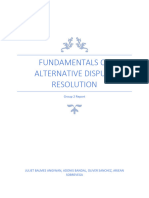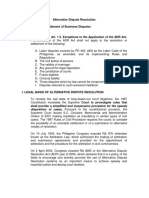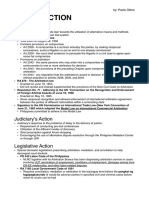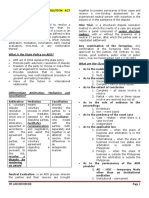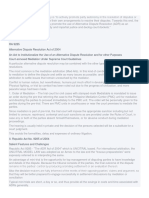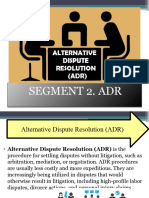Chapter 1
Historical Note
Judicial and legislative trends on dispute resolution consistently lean towards the utilization of
alternative means and methods implemented outside the court trial system.
Civil Code - contains provisions on com- promises and arbitrations (Chapters 1 and 2, Title XIV,
Book IV) which encourage litigants to agree upon a fair compromise and authorize arbitration as
a means of concluding controversies.
RA No. 876 The Arbitration Law – supplemented the provisions of the Civil Code in arbitration
Senate Reso. No. 71 of 1965 – Senate adhered to the UN’s Convention on the Recognition and
Enforcement of Foreign Arbitral Awards
UN’s Convention on the Recognition and Enforcement of Foreign Arbitral Awards - gave
reciprocal recognition allowed the enforcement of international arbitration agreements between
the parties of different nationalities within a contracting state.
United Nations Commission on International Trade Law - aim is to remove or reduce legal
obstacles to the flow of international trade and progressively modernize and harmonize trade
laws.
Judiciary
Responded to the problems of delay in the delivery of justice by requiring pre-trial conferences,
utilization of different modes of discovery, strict proscription against forum-shopping,
abbreviation of proceedings for small claims cases, use of judicial affidavits, requirement of
continuous trial, and encouraging the use of ADR through Philippine Mediation Center or JDR.
Legislative
Passed domestic legislations prescribing arbitration, mediation, and conciliation in specific cases
to help decongest court dockets
Executive
Creation of the Construction Industry Arbitration Commission
Enacted the Rules on ADR between National Government Agencies
RA 9285 ADR Act of 2004
An Act to Institutionalize the Use of an Alternative Dispute Resolution System in the Philippines
and to Establish the Office for Alternative Dispute Resolution, and for Other Purposes.”
Promulgated on April 2 2004
It is the general law applicable to all forms of alternative dispute resolution such as arbitration,
mediation, conciliation, early neutral evaluation, mini-trial, or any combination thereof.\
�Categorized as procedural law, its IRR and the Special ADR Rules were considered applicable
even to cases already pending during their passage
Lawyer’s Role
As part of their duties to the court, lawyers have to assist the courts in encouraging the parties to
avail of alternative means of dispute resolution.
As part of their duties to their clients, lawyers have to explain the benefits of the alternative
dispute resolution system to them.
A lawyer, in view of his excellent communication skills, probity, and legal foresight, can be ap-
pointed as an arbitrator, mediator, conciliator or neutral evaluator.
Chapter 2
Alternative Dispute Resolution
a system, using means and methods allowed by law and approved by the parties, for the purpose
of resolving or facilitating the resolution of disputes and controversies between them, in an
expeditious. and speedy manner, without resorting to court adjudication.
Coverage of Definition
Arbitration, mediation, conciliation, early neutral evaluation, mini-trial
Processes in the NLRC, DOLE Regional Offices, IPO, Mines and Geosciences Bureau,
Insurance Commission, other similar government agencies
Definition according to ADR Act of 2004
any process or procedure used to resolve a dispute or controversy, other than by adjudication of a
presiding judge of a court or an officer of a gov- ernment agency x x x in which a neutral third
party participates to assist in the resolution of issues
ADR Act of 2004 State Policy
to actively promote party autonomy in the resolution of disputes or the freedom of the parties to
make their own arrangements to resolve their disputes.
to achieve speedy and impartial justice and declog court dockets.
Principles of ADR
1. Promotion of party autonomy and self-determination in the resolution of disputes
2. Recognition of ADR as an efficient tool and an alternative procedure for the resolution of
cases.
3. Enlisting of private sector participation.
�Objectives and Benefits of ADR
1. Speedy and impartial justice
2. Declogging of court dockets
ADR Features
1. a means used to resolve a dispute or controversy
2. utilizes means and methods allowed by law.
3. contractual in nature.
4. avoids court trial
5. involves the participation of a natural third party.
Judicial Dispute Resolution – not covered by ADR, part of court proceedings
Court-Annexed Mediation – not governed by ADR Act, required to be conducted prior to pre-
trial
ADR is not inconsistent with judicial proceedings. Judicial proceedings complement ADR
proceedings.
Sources of ADR Rules
1. Domestic laws and rules – either general or special
2. Acts of the Executive Branch
3. Decisions of the Supreme Court
4. International Laws
5. General Principles of Law and Equity
Forms of ADR
1. Arbitration - arrangement for taking and abiding by the judgment of selected persons in some
disputed manner, instead of carrying it to established tribunals of justice, and is intended to avoid
the formalities, the delay, the expense and vexation of ordinary litigation.
2. Mediation - a voluntary process in which a mediator, selected by the disputing parties,
facilitates communication and negotiation, and assists the parties in reaching a volun- tary
agreement regarding a dispute.
3. Conciliation - the adjustment and settlement of a dispute in a friendly, unantagonistic manner.
4. Neutral and early neutral evaluation –
�Neutral evaluation - the parties and their lawyers are brought together to present summaries of
their cases and receive a non-binding assessment by an experienced neutral person
Early neutral evaluation – availed of in the pre-trial phase
5. Mini-trial - a structured dispute resolution method in which the merits of a case are argued
before a panel composed of senior decision makers, with or without the presence of a neutral
third person, after which the parties seek a negotiated settlement.
6. Any combination of the foregoing – so lang as it is not contrary to law, morals, good customs,
public order or public policy
7. Innominate ADR Form - Any arrangement agreed upon by the parties that satisfies the
requisites of ADR,” complies with the essential requisites of a valid contract, not contrary to law,
morals, good customs, public order or public policy
Classification as to the Forms of ADR
1. As to the number of parties: bilateral or multi-lateral
2. As to the number of issues involved: simple or complex
3. As to the extent of the conclusion: complete or partial;
4. As to the role of evidence in proceedings: evidentiary/merit-based or non-evidentiary/non
merit-based
5. As to the pendency of the court case: case-related or independent
6. As to the applicable law: domestic (RA No. 876) or international (ADR Act on International
Commercial Arbitration), or foreign
7. As to the permanence of the ADR provider or practitioner: ad hoc or institutional
Components of ADR
1. Contending parties
2. Dispute or controversy
3. Form of ADR
4. ADR provider or practitioner
Subject Matters of ADR
a. The civil status of persons
b. The validity of marriage or any ground for legal separation
c. The jurisdiction of the courts
d. Future legitime
�e. Criminal liability
f. Those which, by law, cannot be compromised: Art. 2035
Art. 2035. No compromise upon the following questions shall be valid:
(1) The civil status of persons;
(2) The validity of a marriage or a legal separation;
(3) Any ground for legal separation;
(4) Future support;
(5) The jurisdiction of courts;
(6) Future legitime. (1814a)
Seat and Venue of ADR
Seat - the jurisdiction under whose law the proceeding is being conducted.
Venue/Place - actual site where the arbitration is being conducted.
Basic Concepts
Concluding Acts or Agreements - may take the form of a mediated settlement agreement (or
simply “settlement agreement”) or a compromise agreement in the case of mediation, a judgment
based on compromise in the case of a court annexed mediation, or a waiver or quitclaim in the
case of conciliation.
Arbitral Award - partial or final decision by an arbi- trator in resolving the issue in a controversy.
Mediated settlement agreement - contract executed by the mediating parties, with the assistance
of their respective counsels, certified by the mediator, evidencing a successful mediation.
Compromise - a contract whereby parties, by making reciprocal concessions, avoid litigation or
put an end to one already existing
Waiver/Quitclaim - a statement renouncing any right or claim involved in a controversy by one
party in favor of the other.
ADR Providers and Practitioners
1. Arbitrator;
2. Mediator-arbitrator in a mediation-arbitration proceeding; and
3. The neutral third person in a mini-trial, neutral evaluation (neutral evaluator), combination of
ADR forms, or innominate ADR form, who, upon agreement of the parties, is directed to render
a binding assessment.
�Note: Arbitrators and arbitral tribunals do not fall under the classification of quasi-judicial bodies
since they are constituted by virtue of an arbitration agreement rather than by law.
Civil liability: the same as that for public officers as provided for under Section 38(1), Ch. 9 of
the Admin Code of 1987
Sec. 38. Liability of Superior Officers.—(1) A public officer shall not be civilly liable for acts
done in the performance of his official duties, unless there is a clear showing of bad faith, malice
or gross negligence.”
Preference for ADR
Art. 2030. Every civil action or proceeding shall be suspended:
(1) If willingness to discuss a possible compromise is expressed by one or both parties; or
(2) If it appears that one of the parties, before the commencement of the action or
proceeding, offered to discuss a possible compromise but the other party refused the
offer.
The duration and terms of the suspension of the civil action or proceeding and similar
matters shall be governed by such provisions of the rules of court as the Supreme Court
shall promulgate. Said rules of court shall likewise provide for the appointment and
duties of amicable compounders. (n)
Koppel, Inc. v. Makati Rotary Club Foundation - judicial proceedings disregarding arbitration
agreements, conducted beyond the point when the parties should have been referred to
arbitration, are null and void, and the decisions rendered therein shall be set aside in order to
allow the remand of the case to the trial court and the referral of the dispute to arbitration in
accordance with the arbitration agreement.
Office for Alternative Dispute Resolution
- Created by the ADR Act
- Headed by an Executive Director appointed by the President under the recommendation
of the Sec. of Justice
Objective: to promote, develop and expand the use of ADR in the private and public sectors;
assist the government in monitoring, studying and evaluating the use of ADR by the public and
private sectors; and recommend to Congress needful statutory changes to develop, strengthen
and improve ADR practices in accordance with world standards.
Chapter 3 Mediation
Mediation - a voluntary process in which a mediator, selected by the disputing parties, facilitates
communication and negotiation, and assists the parties reaching a voluntary agreement regarding
a dispute.
�Court-annexed mediation - a “mediation process conducted under the auspices of the court.” It is
conducted prior to the pre- trial “where the judge refers the parties to the Philippine Mediation
and Center (PMC) for the mediation of their dispute by trained accredited mediators.”
Court-referred mediation - a “mediation ordered by a court to be conducted in accordance with
the agreement of the parties when an action is prematurely commenced in viola- tion of such
agreement.”
JDR and CAM – not governed by the ADR Act of 2004
Mediator – person who conducts mediation
Parties involved – mediation parties
All other parties - non-party participants who can either be witnesses, resource persons or experts
Classification of Mediation – non-evidentiary or non-merit based, focuses on the facilitation of
communication and negotiation between the parties in order to encourage them to voluntarily
settle their dispute; mediator must refrain from giving legal or technical advice or otherwise
engaging in counseling advocacy, and must abstain from expressing his personal opinion on the
rights and duties of the parties and the merits of any proposal made
Institutional - when administered by, and conducted under the rules of a mediation
institution
Ad hoc – does not conform with the requirements of institutional
Agreement to submit a dispute to mediation shall include an agreement to:
1.To be bound by the internal mediation and administrative policies of such institution;
and
2. To and have such rules govern the mediation of the dispute for the mediator, the parties
and their respective counsels and non-party participants to abide by such rules.
Place of Mediation – parties are given the freedom to agree on the place of mediation. In the
absence of such agreement, the place of mediation shall be any place convenient and appropriate
to all parties.
Stages of Mediation
1. Opening statement of the mediator;
2. Individual narration by the parties;
3. Exchange by the parties;
4. Summary of issues;
5. Generalization and evaluation of options; and
6. Closure.
�Note: The mediation process shall be held in private unless the parties consent to the presence of
persons other than themselves, their representatives and the mediator.
The mediation shall be closed and concluded [i] by the execution of a settlement agreement by.
the parties; [ii] by the withdrawal any party from mediation; or [iii] by the written declaration of
the mediator that any further effort at mediation would not be helpful.
Advantages of Mediation
1. Confidentiality in the mediation process;
2. Prompt, economical and amicable resolution of disputes;
3. The decision-making authority rests in the parties.
Confidential information - “any information, relative to the subject of mediation or arbitration,
expressly intended by the source not to be disclosed, or obtained under circumstances that would
create a reasonable expectation on behalf of the source that the information shall not be disclosed
Expressly confidential – the intention not to be disclosed is expressed by its source
Impliedly confidential - if obtained under circumstances that would create a reasonable
expectation on behalf of the source that the information shall not be disclosed
Confidential information includes:
1.Communication, oral or written, made in a dispute resolution proceeding, including any
memorandum, note or work product of the neutral party or non-party participant;
2. An oral or written statement made or which occurs during the mediation or for
purposes of considering, conducting, participating, initiating, continuing or reconvening
mediation or retaining a mediator; and
3. Pleadings, motions, manifestations, written statements and reports filed or submitted in
arbitration or for expert evaluation.
* List is not exclusive
Legal Effects of Confidential and Privileged Nature
1. A party, mediator or non-party participant may refuse to disclose and may prevent any other
person from disclosing confidential information;
2. Confidential information shall not be subject to discovery and ‘shall be inadmissible in any
adversarial proceeding, whether judicial or quasi-judicial. However, evidence or information that
is otherwise admissible or subject to discovery does not become inadmissible or protected from
discovery solely by reason of its use in mediation.
�3. In an adversarial proceeding, the following persons involved or previously involved in
mediation may not be compelled to disclose confidential information obtained during mediation:
a. Parties to the dispute
b. Mediator/s
c. Counsel for the parties
d. Non-party participants
e. Any person hired or engaged in connection with mediation as secretary, stenographer,
clerk or assistant; and
f. Any person who obtains or professes confidential information by reason of his
profession.
4. In an adversarial proceeding, the following persons in- volved or previously involved in
mediation may not be compelled to disclose confidential information obtained during mediation
5. A mediator may not be called to testify to provide information gathered in mediation.
Exceptions based on Agreement, Nature of Proceedings, Crime, or Social Justice
1. Those contained in an agreement evidenced by a record authenticated by all parties to the
agreement.
2. Those available to the public or made during a session of mediation which is open, or is
required by law to be open, to the public.
3. A threat or statement of a plan to inflict bodily injury or commit a crime of violence.
4. Communication intentionally used to plan, attempt to commit, or commit, a crime, or conceal
an on-going crime or criminal activity.
5. Communication sought or offered to prove or disprove abuse, neglect, abandonment, or
exploitation in a proceeding in which a public agency is protecting the interest of an is protected
by law.
6. Communication sought or offered to prove or disprove a claim or complaint of professional
misconduct or malpractice filed against a mediator in a proceeding.
7. Communication sought or offered to prove or disprove a claim or complaint of professional
misconduct or malpractice filed against a party, non-party participant, or representative of a party
based on conduct occurring during mediation.
Exceptions Based on Public Policy
1. A court proceeding involving a crime or felony; or
2. A proceeding to prove a claim or defense that under the law is sufficient to reform or avoid a
liability on a contract arising out of mediation.
�Limited Use of Exempted Evidence - only such portion of the communication necessary for the
application of the exception can be admitted in evidence.
Privilege of the Mediator - He is required to keep in utmost confidence all confidential
information obtained in the course of the mediation process, and to discuss issues of
confidentiality with the mediation parties before beginning the mediation process.
He may not make a report, assessment, evaluation, recommendation, finding or other
communication regarding a mediation to a court or agency or other authority that will make a
ruling on a dispute that is the subject of a mediation, except:
1. Where the mediation occurred or has terminated, or where a settlement was reached; or
2. As permitted to be disclosed under Section 13 of the ADR Act
Waiver of confidentiality – express or implied
Waiver can also come by way of estoppel such as when a non-party participant himself discloses
the erstwhile confidential information.
The Mediator - mediation parties are given the freedom to select their mediator and they may
request the Office for Alterna- tive Dispute Resolution (OADR) to provide them with a list or
roster of its certified mediators, and their resumes.
A mediator who refuses to act as such may withdraw or may be compelled to withdraw from the
mediation proceedings under any of the following circumstances:
1. If any of the parties requests the mediator to withdraw.
2. The mediator does not have the qualifications, training and experience to enable him to
meet the reasonable expectations of the parties.
3. The mediator’s impartiality is in question.
4. The continuation of the process will violate an ethical standard.
5. The safety of any one of the parties will be jeopardized.
6. The mediator is unable to provide effective services.
7. In case of conflict of interest.
8. Other instances provided for by the IRR.
Duties and Functions of Mediators
1. Prior to mediation
a. On competence - maintain and continually upgrade his professional competence in mediation
skills; ensure that his qualifications, training and experience are known to and accepted parties;
serve only when his qualifications, training and experience enable him to meet the reasonable
expectations of the parties
�b. On impartiality- Before accepting a mediation, the mediator should make an inquiry that is
reasonable under the circumstances to determine whether there are known facts that a reasonable
individual would consider likely to affect his impartiality; and disclose any such fact known or
learned as soon as practicable.
During the mediation
a. Confidentiality
b. On consent and self-determination - A mediator shall exert reasonable efforts to ensure that
each party understands the nature and character of the mediation proceedings.
c. On promotion of respect and control of abuse of process - encourage mutual respect between
the parties.
Mediator’s Costs and Fees - allowed to charge costs, reasonable fees and charges against the
parties but he is under obligation to fully dis- close and explain the basis thereof.
Mediated Settlement Agreements - The concluding document in a successful mediation is called
the mediated settlement agreement or settlement agreement. It may also take the form of a
compromise agreement. It has the effect of res judicata and is binding upon the parties. There can
be no execution of the concluding agreement unless it has first been judicially approved.
Role of Counsel in Mediation
1. Collaborate with the other lawyer in working together to- wards the common goal of helping
their clients resolve their differences to their mutual advantage.
2. Encourage and assist the client to actively participate in positive discussions and cooperate in
crafting an agreement to resolve their dispute.
3. Assist the client to comprehend and appreciate the mediation process and its benefits, as well
as the client’s greater and personal responsibility for the success of mediation in resolving the
dispute.
4. Confer and discuss with the client the mediation process and substance.



